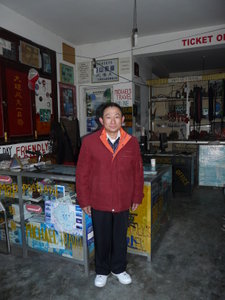Advertisement
Published: January 9th 2011

 Mr. Michael Yang.
Mr. Michael Yang.
Michael in his travel agency. Michael is a bit of a Mr. Fix-It. I felt sure when I asked him if he knew where we could follow a cooking lesson, he'd be able to arrange it. "Yes, with my sister - she was a cook - we used to have a big restaurant". He acted to offer as our interpreter and the next day took us to his home village.
We went on the local bus. It was market day in Dali and the bus was crowded. Women chattering. An old couple nursing a big framed picture on their laps - he gripping one side, she clutching the other. Wicker baskets filled with fruit, vegetables and walnut powder blocked the aisles. A kitten in one of the baskets mewed piteously. I could see the rice sack moving slowly in and out as it breathed. Every few meters someone got on or off. "Shasti", they bawled and the bus stopped. "Seven minutes only", said Michael - forever the positive thinker! Eventually we got out on the still-to-be-completed main road and walked towards a row of newly-built houses. Michael's sister no longer worked as a cook because the old family
home and restaurant had been demolished to make way for this very road. The government owns all land, always. The family were given some compensation, but not enough to equal the value of the business. Now Yang Si Qi stays home all day and looks after her grandchildren.
But today for a short while she was a cook again. Some of the vegetables were already prepared. Little dishes and plates lined the edge of the white-tiled traditional wood-burning stove. "We don't use this anymore, now we use the electric plate or cook with gas, but for you we cook in the traditional way", Michael told us. The cabbage oil was already smoking in the mammoth cast-iron wok. In fact the whole kitchen was smoking. Yang Si Qi's husband (probably fearing for his new house) rushed in to throw open all windows and prop open the door. The little dog took refuge under the tiny, low, toy-town table in the corner.
The first dish was potato pancake. Working on the corner of the burner, Yang Si Qi balanced a wooden chopping board on the gleaming tiles. A thick-bladed meat cleaver flashed in the sunlight as a potato was sliced
deftly into matchsticks. I worried for her fingers and wondered why she had to use such an impressive knife. "It's easier", was the somewhat obscure answer "it's very sharp". The spatula clanked against the metal wok as the potato was patted into a wedge. Golden brown, it slithered from the spatula to the plate and our first dish was complete. No time to stop though, the carrots had already hit the wok. In the Chinese kitchen everything is prepared quickly, fried at a high temperature, in a very little oil, for a minute or two. So simple. So delicious. Deep glowing orange carrot, a pinch of the green of a spring onion for colour - that was it. Three more dishes followed. Cauliflower florets with a dash of red paprika, green cabbage and 'mouldy' beancurd. The little table was beginning to look decidedly full and the little dog was licking his lips. Michael stopped stoking the fire. "I ask her to stop, otherwise it all gets too cold". We sat on the low wooden benches - like doll's furniture - and began tasting. As a cooking lesson this was elementary, but as a feast it was outstanding. We had to
force ourselves to stop - aware that more was coming. "You, maybe two bowls, me three bowls, people working in the fields - six or seven bowls", laughed Michael. Bai people don't eat beef, but like pork and fish. "People need meat to be strong", Michael told us.
Back to the wok. Next his sister fried yam with a little pickle and chilli, then seaweed, and then tomato with egg. Finally she made a soup, boiling strong green leaves in water. "When I was growing up, this was all we ate", Michael told us as he bought his chopsticks up to his mouth - "soup and yam. We were poor, my parents had seven children - now there are only four left". His sister at fifty-two was the eldest. She would've been eight when the Cultural Revolution started. Michael, fourteen years younger wasn't yet born, but he clearly remembers his sister carrying him on her back when she went to work in the fields. His parents also worked in the fields, but his sister was younger, stronger and could bear more. "Now I have enough money to look after my family, but I always tell my wife - not
too much, no waste".
We looked at the table groaning under the weight of the nine dishes, and asked if the family wouldn't eat with us. Michael told us not to worry; 20 people lived in the house - four generations under one roof - nothing would be left over.
Satisfied in every way, we made our way back to the highway to flag down a bus.
Michael has a travel office in old town Dali and works as a guide. He can arrange tours, a driver, calligraphy and tai ji quan lessons, discounted cable car tickets - in fact anything you might need - at reasonable rates. As I said he's a Mr. Fix-It. Fast talking, enthusiastic and entertaining, he helped us a lot and I recommend him whole-heartedly.
Michael Yang. 43 Bao ai Road, Dali. Mobile: 861 3988 5547 33
Advertisement
Tot: 0.22s; Tpl: 0.012s; cc: 21; qc: 84; dbt: 0.1117s; 1; m:domysql w:travelblog (10.17.0.13); sld: 1;
; mem: 1.3mb









heidi swanson
non-member comment
Wow. thank you Jim for the addresses.